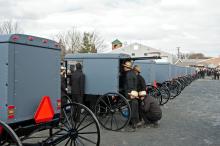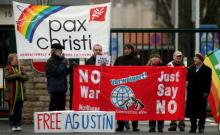pacifism

ONE SUNDAY EVENING during high school, friends from my Mennonite church and I drove around Lancaster County, Pa., stealing mattresses. Bored by too many evenings of roller skating and Truth or Dare, we, like teenagers everywhere, landed on thievery as the solution to adolescent ennui. Having found out which of our friends were away from home, we showed up at their houses, told their parents about our prank, and swore them to secrecy. Then we clomped up narrow staircases to their sons’ and daughters’ bedrooms and wrestled mattresses back downstairs and onto the bed of a pickup truck. Just before our getaways, we left notes on our friends’ dressers, signed with what we thought was a most clever alias: “The Mennonite Mafia.”
We had no idea that 25 years later, Amish Mafia would be a blockbuster reality show, its first episode attracting 10 times more viewers than there are Amish people. Had you told us then that a bunch of Amish and Mennonite kids growing up a few miles away would someday parlay boredom-induced shenanigans into a hit cable TV series, I don’t know whether we would have been flattered or jealous. Kate Stoltzfus? Rebecca Byler? Lebanon Levi? People with names like these—our “plain-dressing” Amish neighbors and the more conservative Mennonite kids we went to school with—were the butt of our jokes, not the cynosures of popular culture.
Only a few decades after we and our families exited the conspicuous conservatism of plain Anabaptism, mass culture is flocking toward it. From Amish-themed reality TV shows to Christian romance novels with Amish characters and settings, the media have finally landed the lucrative Amish account, although the furniture industry and “Weird Al” Yankovic’s “Amish Paradise” got there first. Americans’ enthrallment with the Amish—and schadenfreude about their sometimes wayward youth—has rarely been more intense.

Last year, 506 murders happened in the city of Chicago — the majority of them in black communities. Similar rates of violence swept through places like Philadelphia, Camden, N.J., New Orleans, and the list could go on and on. I have in my life begun to declare myself a pacifist. I have made this change because I think, as a black man, the only recourse for me is to try and stop violence that happens in so many black communities. Turning the other cheek, responding with a gentle answer, forgiving a misunderstanding: these are the paths to recovery in my neighborhood.
The “if someone hits you, hit them back” mentality is destroying black men at an alarming rate. Dads, teach your boys to talk it over, look the other way, or keep walking when things begin to escalate.

Whenever I talk with people about Jesus and nonviolence, a curious thing happens. Someone will inevitably raise his hand (and it’s always his hand), call me a wuss, and then accuse me of making Jesus-Christ-Our-Lord-And-Savior into my own wussy image.
First, the accusation that I’m a wuss is totally true. No one can surpass my wussiness. I run from confrontation, and if I ever get into a fight my money is on the other guy.
Now, to the second accusation that a nonviolent Jesus is a projection of my own wussy imagination: That is false and, in fact, the reverse is true – a violent Jesus is a god made in our own image. As a self-professed wuss, I would love a bad-ass-machine-gun-toting Jesus who violently defends me against my enemies. I want the Jesus depicted in Saturday Night Live’s sketch DJesus Ucrossed. (A sketch satirizing Quentin Tarantino’s Django Unchained.) As David Henson brilliantly states in his post “DJesus Uncrossed: Tarantino, Driscoll and the Violent Remaking of Jesus in America,” the sketch “pulls back the curtain and shows us just how twisted our Jesus really is: We want a Savior like the one SNL offers. We want the Son of God to kick some ass and take some names. Specifically, our enemies’ names.”
David goes on to quote Mark Driscoll, a megachurch pastor from Seattle whose theology of hate has had a major influence on American Christianity. Driscoll states,
In Revelation, Jesus is a prize fighter with a tattoo down his leg, a sword in His hand and the commitment to make someone bleed. That is a guy I can worship. I cannot worship the hippie, diaper, halo Christ because I cannot worship a guy I can beat up.

Recently, I had the opportunity to visit the DMZ (Demilitarized Zone) between the two Koreas along with a group of students and faculty from George Fox University. As the most fortified border on the entire planet, the DMZ contains an arsenal of tanks, land mines, watchtowers, razor wires, artillery, and nearly two million armed troops ready to face off within a moment’s notice. Former President Bill Clinton described the DMZ as the “scariest place on earth,” a description more eerie coming from one of the few people in history to have had direct access to the “button.”
While observing the various sites within the DMZ, I thought about how the pacifist Quakers, who founded my school in 1885, would have reacted to such an experience.

Like most people, I was deeply troubled by news of another mass shooting, this time at a Sikh temple in Oak Creek, Wis., not far from Milwaukee. On the heels of the tragic massacre in Aurora, Colo., this seemed all the more savage to me, given that it took place in a house of worship.
Maybe it’s because my wife and I work in a church and are aware of such vulnerabilities every day, but my first reaction is defensiveness. I want to raise my guard, double-check the locks and do whatever I can to ensure our safety. It’s the response that makes the most sense, after all.
Or is it?

Editor's Note: The following is a question from Christian Piatt's book Banned Questions About Jesus. It is on sale on Amazon Kindle for $2.99 through July 25.
Jarrod McKenna: No.
Jesus did not come to bring peace but a sword. And we as disciples must wield the same sword Jesus brings, and no other.
The question is, what is this sword?
What is this sword that heals rather than harms enemies?
What is this sword that never collaborates or mirrors the Powers, thereby exposing their addiction to violence?
What is this sword that prophetically turns over tables of idolatry and injustice in a judgment that does not harm, hurt, coerce or kill anyone?
What is this fire that is ablaze with the very presence of I AM in response to the cries of the oppressed, this fire that does not destroy the bush in which it burns?
What is this power that is ablaze on the cross, sucking the oxygen of injustice and violence from creation then causes a cosmic backdraft in the resurrection, setting the world alight with the love that conquers death?

One of the U.S. Constitution's difficult balances is found in the freedom of religion clause of the First Amendment:
“Congress shall make no law respecting an establishment of religion, or prohibiting the free exercise thereof …”
What happens when those two values conflict?
That is the issue with the controversy over whether religiously-affiliated organizations should be required to offer free coverage for contraception in health insurance plans made available to employees. Those opposed — most notably Catholic organizations — claim that this requirement would violate their freedom of conscience. Those who support it claim that exempting religiously-affiliated organizations would establish a religion over the rights of individuals.
